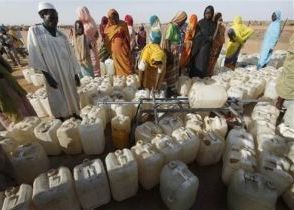US envoy calls for alternative solutions to cover Darfur humanitarian gaps
April 4, 2009 (KHARTOUM) — One month after the expulsion of 13 aid groups from Darfur region, the US President Envoy to Sudan has called for alternative solutions to fill the gaps of humanitarian needs in war torn region.
 On March 4, Sudan expelled 13 foreign non-governmental organizations after accusing them of cooperation with the International Criminal Court which issued an arrest warrant for the President Omer Al-Bashir on war crimes charges.
On March 4, Sudan expelled 13 foreign non-governmental organizations after accusing them of cooperation with the International Criminal Court which issued an arrest warrant for the President Omer Al-Bashir on war crimes charges.
The Sudanese decision affected 40% of Darfur humanitarian aid. The decision threatens more than 3 million people with the loss of food, health care and safe drinking water, the UN estimates.
Sudan rejects a US request to allow the return of the ousted groups saying it will fill the gaps with the local NGOs and also invited Arab and other aid groups from friendly countries to work in Darfur region.
The US chargé d’affaires Alberto Fernandez met on March 10 with the secretary of political relations at the National Congress Party (NCP) Mohamed Mandor Al-Mahdi who told him that the government does not intend to reverse its decision to expel the aid workers. “We told them clearly there is no room to annul or freeze the decision” Mandor said.
Scott Gration, who visited Darfur today for the first time, excluded prospects for the return of the evicted aid groups. “That is why we need to come up with creative ways immediately, and when I say immediately I mean in the next weeks, to be able to compensate by bringing in other capabilities or taking steps to expand the capabilities of existing NGOs.”
“I came away very concerned about what I saw and believe that we are on the brink of a deepening crisis in Darfur,” he told journalists after a morning visit to the Zam Zam camp in North Darfur.
He stressed there are immediate problems on water and health care that face displaced persons in Darfur.
The US envoy said he was confident Sudanese authorities “will understand the seriousness of this situation and work with the international community to resolve this issue.”
He further suggested to fill the gaps left by the expelled NGOs by building up local organizations.
“We want to work with Sudanese NGOs. I believe they have the capability to fill some of the gaps in terms of food.”
“We need an environment where we can use all sources, NGO help, maybe NGOs that come in from Arab nations, additional NGOs from traditional donor countries and maybe a workable solution for some of the people that have been working in the area historically,” he further said.
He also appealed to Sudanese authorities to return some 400 vehicles and other assets seized after the eviction of the 13 aid groups and to speed up visa applications for new aid workers.
The expelled groups had distributed food, offered medical care and provided access to water to some 2.7 million displaced in Darfur.
UN humanitarian coordinator for Sudan, Ameerah Haq, pointed out that with the departure of the expelled groups the humanitarian work lost expertise monitoring and evaluation in various field. “This capacity, and the associated institutional memory and contextual knowledge, cannot be replaced easily or quickly,” she stressed.
Following the release of a joint committee to assess the humanitarian gaps left in Darfur on March 24, Haq said that they agreed with the Sudanese authorities and the remaining NGOs on a “concerted stop-gap drive” to meet the immediate needs of the affected population during a period of two months.
(ST)
